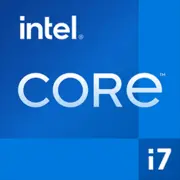Intel Core i7-14700K

Intel Core i7-14700K: Complete Review of the 2025 Processor
Codename: Raptor Lake Refresh
Process Technology: Intel 7 (10 nm Enhanced SuperFin)
Cores/Threads: 20 (8 P-cores + 12 E-cores) / 28
Frequencies: 3.4 GHz (base) / 5.6 GHz (turbo)
L3 Cache: 33 MB
TDP: 125 W
Graphics: Intel UHD Graphics 770
Geekbench 6: 2936 (Single-Core) / 20992 (Multi-Core)
1. Key Specifications: Architecture and Performance
Hybrid Architecture of Raptor Lake Refresh
The Intel Core i7-14700K is an evolution of the 13th generation, built on a hybrid architecture featuring Performance-cores (P-cores) and Efficient-cores (E-cores). With 8 P-cores (with Hyper-Threading) and 12 E-cores, it achieves a balance between single-thread and multi-thread performance, making the chip versatile for gaming and work tasks.
Process Technology and Energy Efficiency
Despite the "10 nm" label, Intel employs the enhanced Intel 7 technology, which has reduced power consumption by 10-15% compared to its predecessors under similar loads.
Key Features:
- PCIe 5.0 support (up to 16 lanes for the GPU + 4 for NVMe).
- Thunderbolt 4 (up to 40 Gbps).
- Intel Adaptive Boost technology for automatic overclocking up to 5.6 GHz.
- Hardware optimization for Windows 11 (thread scheduler).
Performance
In Geekbench 6, the i7-14700K outperforms the AMD Ryzen 7 7800X3D in single-thread tasks (~15%) but trails behind the Ryzen 9 7900X in multi-thread tasks (~8%). In gaming (e.g., Cyberpunk 2077 with RT Ultra), it delivers stable 110-120 FPS at 1440p when paired with an RTX 4070 Ti.
2. Compatible Motherboards
LGA 1700 Socket: Last Chance for Upgrades
The processor uses the LGA 1700 socket, compatible with 600 and 700 series chipsets:
- Z790 — for enthusiasts: overclocking, PCIe 5.0 x16, up to 4 NVMe. Example: ASUS ROG Strix Z790-E Gaming ($450).
- B760 — for mid-budget: limited overclocking, PCIe 4.0. Example: MSI MAG B760 Tomahawk ($180).
- H770 — basic platform: no overclocking, 2 NVMe slots.
Important: The i7-14700K requires a BIOS update on 600 series motherboards.
3. Memory Support: DDR4 vs DDR5
The processor works with DDR4-3200 and DDR5-5600.
- DDR4 — budget option: 32 GB Kingston Fury Beast (DDR4-3600) costs $80.
- DDR5 — future-proof: 32 GB G.Skill Trident Z5 (DDR5-6400) costs ~$150.
Tip: For gaming, the difference between DDR4 and DDR5 is minimal (3-5% FPS). However, for rendering tasks, DDR5 speeds up processing by 10-20%.
4. Power Supply Recommendations
With a TDP of 125 W and peak consumption up to 250 W (when overclocked), the minimum power supply wattage recommended is 650 W. For systems with top-tier GPUs (RTX 4080/4090), choose a power supply of at least 850 W.
Examples:
- Corsair RM750e (750 W, 80+ Gold) — $120.
- Seasonic PRIME TX-1000 (1000 W, 80+ Titanium) — $300.
Important: Use PCIe 5.0 cables for compatibility with new GPUs.
5. Pros and Cons
Pros:
- Outstanding single-thread performance for gaming.
- Support for both DDR4/DDR5 — flexible build options.
- Good overclocking potential (up to 5.8 GHz on liquid cooling).
Cons:
- High heat output under load (requires cooling solutions from $100).
- Price: $430 compared to $380 for Ryzen 7 7800X3D.
6. Use Cases
- Gaming: Maximum FPS at 1440p/4K. Ideal for CS2, Starfield, Alan Wake 2.
- Work Tasks: Rendering in Blender, code compilation, working with AI models.
- Multimedia: Streaming in OBS without lags thanks to 28 threads.
7. Comparison with Competitors
- AMD Ryzen 7 7800X3D: Better in gaming (+7% FPS) but weaker in multi-thread tasks (-25%). Price: $400.
- AMD Ryzen 9 7900X: 12 cores, higher multi-thread performance (+15%) but more expensive ($500).
- Intel Core i9-14900K: Maximum performance, but with a TDP of 253 W and a price of $600.
Conclusion: The i7-14700K is a sweet spot between price and performance.
8. Building Tips
- Cooling: Arctic Liquid Freezer II 360 ($130) or Noctua NH-D15 ($110).
- Case: Choose models with good airflow (Lian Li Lancool III, $150).
- BIOS Update: Update the motherboard firmware before installing the processor.
9. Final Verdict: Who is the i7-14700K For?
This processor is ideal for those seeking balance:
- Gamers looking for maximum FPS without overspending on an i9.
- Professionals working with editing and 3D tasks.
- Enthusiasts who appreciate overclocking capabilities.
Alternatives:
- If on a budget — Ryzen 7 7800X3D.
- If multi-thread performance is needed — Ryzen 9 7900X.
In March 2025, the i7-14700K remains relevant due to its flexibility and stability. Priced at $430, it is a worthwhile upgrade option for older systems on LGA 1700.
Basic
CPU Specifications
Memory Specifications
GPU Specifications
Benchmarks
Compared to Other CPU
Share in social media
Or Link To Us
<a href="https://cputronic.com/cpu/intel-core-i7-14700k" target="_blank">Intel Core i7-14700K</a>




